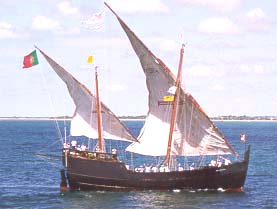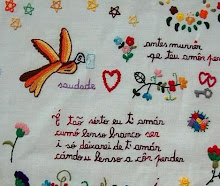terça-feira, outubro 23
Live Portugal to Understand Fado
sábado, outubro 13
Mariza at David Letterman's Show 11.10.07
Mariza is in NYC to promote her new Cd "Live in Lisbon" and Saura´s movie "Fados". She is going to make 13 live performances; here is the video (uploaded 14 hrs ago!!!) of her in David Letterman´s Late Show. Yesterday night she gave a concert at the Carnegie Hall, Manhattan.
This video is sooo "fresh" that I can´t help to put here NOW!
This song is definitely one of my favourites "Oh people of my land" and I will tell you everything about it in the right time (it is beautifully beautiful). I will tell also about Mariza, who she is and what she means to me, and to all portuguese in general, her work, my favourite videos, the meaning of the songs, my favourite videos on the astonishing live performance in Lisbon, everything!!! I will dedicate a big time of this blog to her. By now, just a video. Maybe I shouldn´t...It´s too much, I know!!! Too emotional and intense...You might even be scared! ahah Its ok! Relax... with the time, and I hope this blog helps, You will understand it and LOVE it! I am sure.
:P
oh! and here is a funny comment I found on Youtube
"i saw her concert in new bedford, front row and everything! plus i got to talk to the guitarist with the long black hair a little bit after. lol he came up to the car asking for a good place to get a drink, and we didn't even think of inviting him to the place we were going. she's such an amazing singer, i wish i knew how to speak portuguese = ( lol thank god she gives english translations of the songs." isdcdancer (8 hours ago)
(proud, proud, proud eheh)
sexta-feira, outubro 12
Universal Language
Understanding the lyrics of Fado would be like putting a cherry in the top of the cake! They are beautiful, of course, but so intimately related to “being Portuguese”, to a whole collective imaginary, a legacy of meanings, that translating is often a dull and deceiving task. We all know a word is not just a word: it has a value inside of each culture.
So, after this, enough of words! I will leave you with the most important Portuguese guitarist of all times: gentleman Carlos Paredes. He called this song “Discurso” (Speech) to show that the guitar can talk by itself. And this sonority is soooo Portuguese; it is the basis of Fado. I believe that for the beginners in this “fado issues” this should be the first composer to listen (making your ears used to this remarkable sounds).
Hope you like it.
In the introduction we hear some words in portuguese; It is Paredes himself saying something like “ I don´t like public speeches; after them always comes a punishment, a reprimand, a hard critic [for something that we said and it was wrong]. This is the reason I shall use the guitar to say my “Discurso”.
He ends his "played speech" with the funny words "And I´ve said it!"
And here is one of my favourite ballads performed by Carlos Paredes : "Verdes anos" or "Tender Years ", for you! :)
Listen carefully and feel privileged
There is so much to tell about this fascinating man and the Portuguese guitar...And I will!
***
Fado through the eyes of a foreigner

“A friend of mine insists that you have to be Portuguese to understand fado. In one sense she's right—fado is intimately associated with poetry, and you pretty much have to be a native speaker to grasp that part. And the feeling of the music is also intimately associated with saudade. The fact that saudade has no direct translation into English is an important point (close ideas include nostalgia, loneliness, yearning, and missing). My Portuguese friend's eyes immediately glaze over when she hears that word.
But words are just one form of language. Music is another. You don't have to be Andalusian to appreciate flamenco, and you most certainly don't have to be African American to dig the blues. Folk music is the music of the people, passed down the generations by ear. And needless to say, it goes quite well with dance.
But then I'm not Portuguese, so what do I know.
A quick rundown of informative words from the English translation: silence, fire, happiness, grief, kiss, weeping, suffering, sadness, soul, bitterness, hurt, live, ashamed, peace, smiles, fury, exile, lost, learned, know, destroyed, dead, enchantment, nearness, turmoil, madness, emotion, discovery, immensity, escape, free, love, broken and undone, fatal, spring, died, condemned, weeping, forgetting, enchantment, fear, distress, freedom, alliance, secrecy, solitude, fun, dancing, truth, passion, the heart, happiness.
And don't forget saudade. That one couldn't be translated.”
Nils Jacobson Managing Editor, All About Jazz, 2001 to 2007; Contributor Since 1999
quinta-feira, outubro 11
Povo que lavas no rio
And there was singing!! Some of the most expressive and funny songs we know were created in this special ambience. Here is an example of how it was in 30´s (this video was taken from the movie "Aldeia da Roupa Branca" (Village of the white clothes, 1938)
"Oh river don´t complain
the soap doesn´t kill
Even washes the fish
Leaves them like silver!
...
Cold water from the river
Cold water that the sun made warm
seeing the village, brings to the idea
White clothes that we hung to dry"
For you to have an idea of how it was! :)
So...inspired on this scenario, filled up with humble and generous people, Pedro Homem de Mello wrote in Povo que lavas no rio (I will try to find a translation), a fado that was first performed live by Amalia in 1963. But it is not a joyful song like those sang by the "lavadeiras". It is a song that talks about these people, their simplicity, their light hearts, heir hopeless destiny based on a lifetime of hard work; there are no metaphysical concerns on their minds just the resigned certainty that the next day of work would come and that God would be there for them no matter what.
Here is a video of this song performed by Mariza on the Royal Albert Hall in November 2006, London
Sempre Sempre Amor, 1953
Its rare and it is here
Thank you for the user who uploaded it!
On that sad 6th of Ocober

Here is a Dvd Amalia Rodrigues: The Spirit of Fado (2006) documentary that examines the life of the remarkable singer, the history of the fado, and includes footage of Amália performing some of her timeless songs.
We all miss you.
segunda-feira, outubro 8
IMDB.com
I was able to view Fados at its premiere at the Toronto International Film Festival. The only thing truly impressive was the presence of Carlos do Carmo - Portugal's king of Fado music. The film itself spends too much time showing us the offspring of traditional Fado - the "Fado Hip-Hop", "Fado Flamenco" and so on. Compiling as many or more non-Portuguese singers as it did local talent. The few minutes spent in a homage to the one person that will always be the soul of Fado - Amalia Rodrigues, was wasted in a short video of Amalia practicing a new song. Carlos do Carmo cannot sing anything that is not impressing and beautiful and Mariza, Portugal's most popular Fado singer of modern times, also comes through with two delightful songs. Where are Tony de Matos, Herminia da Silva and all the other singers that made Fado popular around the world? Too much time was spent showing us artsy shots of modern dance choreographed to the music that was supposed to be the focus of the film. No narration was included to allow the viewer that is not a connoisseur of Fado music to follow along with the rest of us. How many people will know who Severa is after the credits roll? A much better choice would have been to fill the 85 or so minutes with traditional Portuguese singers bringing this beautiful, soulful song to the screen. After all, who wants to see Brazilian and African singers, who can barely speak the language properly - sing this music that must be as much sung from the heart as it does from the soul?
in IMBD user comments
Haven´t seen the movie so far but somehow I feel this will be the sound of my opinion. You see...kind of "purist" in what concerns Fado and seeing it side-by-side with hip-hop and flamenco reminds me a little like the Oporto wine mixed with orange juice or tonic water (I am scratching my head now!). About the influences of Africa and Brazil they are undeniable. In fact theories exist whether they are "an influence" or the cradle itself. This I will leave to another post.
domingo, outubro 7
Washington Square News: movie critics
Fados (2007)
Dir: Carlos Saura

Set on a gorgeous lacquered soundstage, “Fados” is a tapestry of various incarnations of the genre, from modern hip-hop to archival footage of iconic singers. Though the last 15 minutes feels like a gauntlet, Saura’s cohesive vision makes it an exhilarating kind of exhaustion. Every performance is impassioned and filmed with a reverence and an intimate understanding that makes “Fados” an unforgettable experience. I must have this soundtrack.
By Simon Abrams
"Fados", The movie
The movie came to theaters on October 4th. I didn´t see it yet. Is it because of the director? eheh maybe...I am "afraid" of the "vision" a spanish gentleman may have of something so deeply portuguese. We´ll see.












